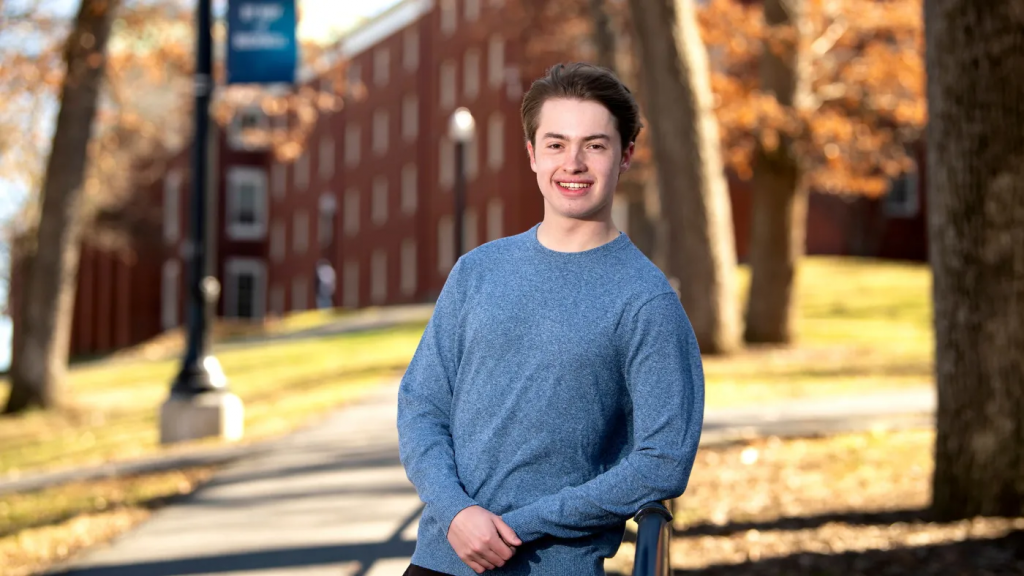Contact:
Mike Ferlazzo
570-577-3212
570-238-6266 (c)
mike.ferlazzo@bucknell.edu
LEWISBURG, Pa. (June 21, 2023) – Studies suggest that adding green spaces like parks and gardens to towns and cities can enhance the local community – not only by adding natural beauty but also by improving residents’ health and well-being.
Matt McMullen ’24, a geography major from Ewing, N.J., wants to help two former Pennsylvania coal-mining towns reap these benefits.
For the past year, McMullen has been working as a place studies research intern with the Bucknell Center for Sustainability & Environment, conducting research that will inform revitalization efforts in Shamokin, Pa., and Kulpmont, Pa. The aspiring urban planner is drawing up plans to clean up two vacant lots and transform them into “pocket parks” or “parkettes” – small outdoor spaces where grass, trees and flowers can grow and neighbors will flock to and flourish.
“In urban, low-income communities, the need for green spaces is important; they provide an outlet for residents to rest, increase social interactions among community members and reduce stress,” McMullen says. “They also improve the landscape by incorporating plants and other types of biodiversity into these spaces that can enhance the environment.”
Charting His Own Course
McMullen began his Bucknell career as a civil engineering major. While he found the coursework interesting, he recognized he lacked a passion for it. He went searching for a better fit and found it within the geography department.
As he settled into his new major, McMullen wanted to learn more about his prospective field. He reached out to the Bucknell Center for Sustainability & Environment to learn about its place studies program. Its director, Shaunna Barnhart – a geographer who studies sustainability dilemmas in communities – saw McMullen’s potential as a research intern, a position he’s held since January 2022. Barnhart tasked McMullen with working with local groups who are transforming and greening rundown lots in former coal-mining towns, several of which are located about 40 minutes from campus.
In these small, rural Pennsylvania towns, anthracite coal mining was once the foundation of a prosperous industrial economy. But as the industry went into decline, starting in the 1970s, these towns began a decades-long struggle with high unemployment, deteriorating infrastructure and a depleted working-class community.
The pocket parks McMullen is designing for these communities might be small, but they offer something big: green spaces with grass, trees and flowers that improve the biodiversity of a landscape and the overall welfare of residents.
His first project was the Sunbury Street Community Park in Shamokin, Pa., which was adjacent to a busy Dunkin’ Donuts. “They were hoping to create a space that not only provides a park but also for people to eat or do other social activities,” McMullen says. He surveyed the location, performed community outreach and proposed a preliminary design with a budget and materials list.
During his research, he learned how critical it was to engage with the community and work alongside local organizations – in this case, the Shamokin Community Gardens group – to identify preferences and enlist volunteers. Although the park doesn’t have electricity or running water, McMullen reimagined the lot with solar lighting, seating and dining areas, bike racks, masonry retaining walls, raised bed gardens and pretty planter urns. McMullen’s work has been used by local groups to apply for funding to make the plans a reality.
McMullen then headed to the nearby borough of Kulpmont, Pa., to examine an underutilized double vacant lot on Chestnut Street. Although the philosophy was the same, the Kulpmont location had different needs. For example, the sloped space is bigger than Shamokin’s Sunbury Street – about 9,000 square feet. And when McMullen checked in with the community, many voiced concerns about public safety. “It’s important that we reclaim these vacant lots,” says McMullen, “because they can be hubs for criminal activity.”
For more than a year, McMullen has been invested in projects like this and says he is surprised by how passionate he’s growing about urban planning. In March, he took what he learned and presented a paper on the impact of pocket parks at the American Association of Geographers’ conference in Denver.
“As a student, it can be hard to find your footing,” he says. “There are so many majors and so many career opportunities, it can feel overwhelming. That’s how I felt when I was switching my major. I’m very thankful for the opportunity to do hands-on work and gain experience outside of the classroom. Through this internship, I’ve found my footing.”
After graduation, McMullen plans to continue working in urban planning and landscape architecture, with a focus in park design. He’s hoping, by that time, the pocket parks he’s dreamt up in the heart of Pennsylvania are improving the lives of community members.
“Just looking at the towns, you can see there’s this weight,” he says. “I like the idea of designing a space that people can use and that can spur revitalization. I’m glad that I can act as a positive force in the towns I work with.”
-30-
To download full image, right-click and choose “save image as”


